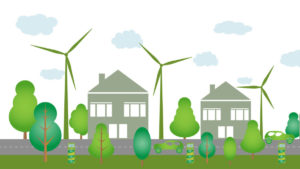ASX Renewable Energy Stocks: Genmin locks in renewable hydro for Baniaka Iron Ore Project

Pic: Yuichiro Chino / Moment via Getty Images
- GEN signs an MoU for supply of 30 MW of renewable hydroelectricity from the Poubara hydropower station
- The move is consistent with GEN’s plans to deliver greener iron ore products to global markets
- Zeotech identifies opportunities for materials-based greenhouse gas (GHG) mitigation
African iron ore explorer and developer, Genmin (ASX:GEN), has signed an MoU for the supply of renewable hydroelectricity from the Grand Poubara hydropower station for the Baniaka Iron Ore project in Gabon.
The term of supply is up to 20 years, with pricing reflecting the generally lower cost of hydroelectricity generation, and is less than US¢10 per kilowatt hour (kWh).
About 30MW will provide all Baniaka’s initial electricity requirements negating the need to fund, construct and maintain an onsite power station.
GEN says it will build and operate a 30km transmission line from Poubara ensuring it remains dedicated to Baniaka.
Genmin CEO Joe Ariti said from its initial arrival in Gabon back in 2012, the company has been committed to purchasing clean, renewable energy from Poubara to power a mining operation just 30km away.
“This is consistent with our ESG values and also impacts project economics in a positive way,” he said.
“Our vision is to become Gabon’s first iron ore producer and in doing so deliver high-grade, greener iron ore products to global markets, promoting reductions in Scope 1 and Scope 3 carbon emissions in iron making.”
Genmin (ASX:GEN) share price today
Zeotech finds multiple opportunities for zeolite-based greenhouse gas mitigation
Emerging mineral processing tech company, Zeotech (ASX:ZEO) is upbeat this morning following news that Griffith University wrapped up a three-month Extended Carbon Market Scoping Study, forming part of the company’s dual stream agricultural product development project underway at the university.
This study was strategically tailored to identify opportunities for materials-based greenhouse gas (GHG) mitigation, made possible with Zeotech’s proprietary mineral processing technology for the low-cost production of manufactured zeolites.
It found manufactured zeolites have the potential to contribute to climate change for three major greenhouse gases – carbon dioxide, methane and nitrous oxide.
According to Griffith University’s Dr Chris Pratt, the carbon markets scoping study “confirms manufactured zeolites have the potential to play a significant role” in GHG mitigation.
“Methane emissions remain a critical sustainability challenge and working on developing zeolite centric solutions to achieve this is an exciting and important opportunity,” he said.
An additional seven opportunities for manufactured zeolites have also been identified to achieve potential climate change mitigation outcomes.
These include:
- Zeolite application to landfill cover soils to mitigate methane emissions
- Calculating fertiliser GHG offsets by replacing conventional fertilisers with zeolites
- In vitro testing on methane reduction potential of zeolites as a livestock feed
- Engineered wetlands to mitigate wastewater methane and nitrous oxide emissions (following on from opportunity #1)
- Incorporating zeolites into methane oxidation technologies for coal mines
- Zeolites in livestock housing to suppress ammonia emissions and;
- Using zeolites to catalyse the crystallisation of inorganic carbonate minerals.
Griffith will now prepare a proposal to carry out further research on the two highest-ranking opportunities of landfill methane mitigation and fertiliser greenhouse gas offsets.
The short-term projects, which will run parallel with the existing program, will aim to establish the commercial feasibility and market readiness of each opportunity.
Zeotech (ASX:ZEO) share price today
Related Topics
UNLOCK INSIGHTS
Discover the untold stories of emerging ASX stocks.
Daily news and expert analysis, it's free to subscribe.
By proceeding, you confirm you understand that we handle personal information in accordance with our Privacy Policy.








